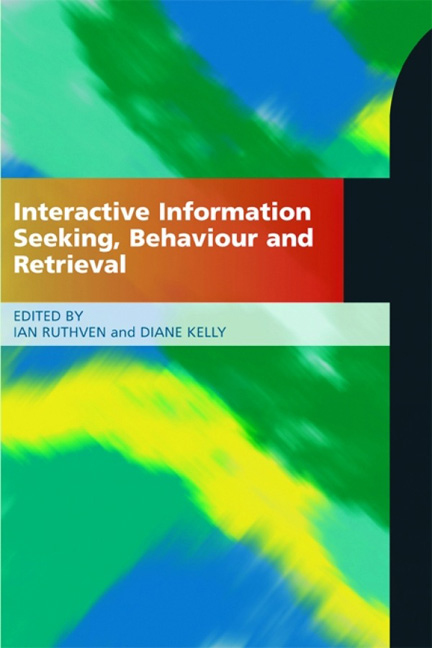Book contents
- Frontmatter
- Dedication
- Contents
- Figures and tables: acknowledgements
- Contributors
- Foreword
- Preface
- 1 Interactive information retrieval: history and background
- 2 Information behavior and seeking
- 3 Task-based information searching and retrieval
- 4 Approaches to investigating information interaction and behaviour
- 5 Information representation
- 6 Access models
- 7 Evaluation
- 8 Interfaces for information retrieval
- 9 Interactive techniques
- 10 Web retrieval, ranking and personalization
- 11 Recommendation, collaboration and social search
- 12 Multimedia: behaviour, interfaces and interaction
- 13 Multimedia: information representation and access
- References
- Index
2 - Information behavior and seeking
Published online by Cambridge University Press: 08 June 2018
- Frontmatter
- Dedication
- Contents
- Figures and tables: acknowledgements
- Contributors
- Foreword
- Preface
- 1 Interactive information retrieval: history and background
- 2 Information behavior and seeking
- 3 Task-based information searching and retrieval
- 4 Approaches to investigating information interaction and behaviour
- 5 Information representation
- 6 Access models
- 7 Evaluation
- 8 Interfaces for information retrieval
- 9 Interactive techniques
- 10 Web retrieval, ranking and personalization
- 11 Recommendation, collaboration and social search
- 12 Multimedia: behaviour, interfaces and interaction
- 13 Multimedia: information representation and access
- References
- Index
Summary
Introduction
‘Information behavior’ is currently a preferred term to describe the many ways in which humans interact with information, in particular, the ways in which people seek and utilize information.
Marcia J. Bates (2010, 2381)A substantial body of literature exists on empirical studies and theoretical discussions of information behavior. Taking a literary-warrant approach, we note that research in human information behavior has investigated a broad range of topics: information needs, information seeking, looking for information, searching information retrieval systems, browsing information resources, finding inform ation, relevance judgment, information use, information generation, infor - mation communication, information sharing, information transfer, personal information management, accidental information encountering, serendipitous information, information avoidance, affect associated with information, information habit, information style, and any information-related human behavior.
As a preferred term, ‘information behavior’ has its evolutionary path. In the early 19th century, studies about information use focused on usage of information resources and channels or systems (e.g. journals, interpersonal communications and libraries). After World War 2, the rapid development in science and technology led to the advent of online information retrieval systems, which marked a new era of information storage, dissemination and retrieval. User studies in the late 1960s and 1970s expanded from investigating information use to observing information need, for example by scientists and engineers in their work environments. It was also during this period that much debate was devoted to the concept of relevance as it was a key element for two traditional measures of information retrieval performance: recall (the percentage of the relevant documents being retrieved) and precision (the percentage of the retrieved documents that are relevant). In the late 1970s and 1980s, the information world witnessed the transition from card catalogs and print indexes and abstracts to online public access catalogs (OPACs) and various commercial online information retrieval services.
The term ‘information seeking’ occurred in the literature as a short form for information need, seeking and use. The first International Conference on Information Seeking in Context (ISIC), held in Finland in 1996, was significant as the meaning of context was debated; a substantial number of papers reported on research of real users taking qualitative, naturalistic or multiple approaches; and research findings included not only purposive, active information-seeking behavior such as work-task-related behavior, but also unintentional, passive information behavior such as accidental information encountering and information avoidance.
Information
- Type
- Chapter
- Information
- Interactive Information Seeking, Behaviour and Retrieval , pp. 15 - 42Publisher: FacetPrint publication year: 2011
Accessibility standard: Unknown
Why this information is here
This section outlines the accessibility features of this content - including support for screen readers, full keyboard navigation and high-contrast display options. This may not be relevant for you.Accessibility Information
- 3
- Cited by
